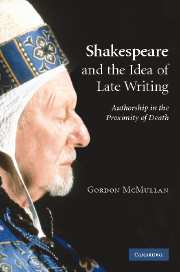Book contents
- Frontmatter
- Contents
- Acknowledgements
- Introduction
- 1 Shakespeare and the idea of late writing: authorship in the proximity of death
- 2 The Shakespearean caesura: genre, chronology, style
- 3 The invention of late Shakespeare: subjectivism and its discontents
- 4 Last words/late plays: the possibility and impossibility of late Shakespeare in early modern culture and theatre
- 5 How old is ‘late’? Late Shakespeare, old age, King Lear
- 6 The Tempest and the uses of late Shakespeare in the theatre: Gielgud, Rylance, Prospero
- Notes
- Index
3 - The invention of late Shakespeare: subjectivism and its discontents
Published online by Cambridge University Press: 22 September 2009
- Frontmatter
- Contents
- Acknowledgements
- Introduction
- 1 Shakespeare and the idea of late writing: authorship in the proximity of death
- 2 The Shakespearean caesura: genre, chronology, style
- 3 The invention of late Shakespeare: subjectivism and its discontents
- 4 Last words/late plays: the possibility and impossibility of late Shakespeare in early modern culture and theatre
- 5 How old is ‘late’? Late Shakespeare, old age, King Lear
- 6 The Tempest and the uses of late Shakespeare in the theatre: Gielgud, Rylance, Prospero
- Notes
- Index
Summary
Shakespeare is the only biographer of Shakespeare. […] So far from Shakespeare's being the least known, he is the one person in all modern history fully known to us.
It is a preposterous kinde of writing to beginne the story of a great mans life, at the houre of his death.
For you yourself, sir, should be as old as I am – if, like a crab, you could go backward.
Needless to say, the discourse of Shakespearean lateness did not emerge fully formed with one critic in the 1870s. I have so far described the general debt of late-style critics to Dowden and I have outlined the twentieth-century debates over the delimiting features of late Shakespeare. I want now, in the course of the next two chapters, going backward like Hamlet's crab, to trace the history of the possibility of late Shakespeare in the context of the larger history of the emergence of the general idea of late writing. By ‘a history of the possibility’, I mean, in part, a narrative of the development of the conditions for that emergence, one that will involve assessing the understanding available to Shakespeare and his contemporaries of the significance of last words and of last moments and the extent to which this understanding might inform the idea of late Shakespeare as it would in due course emerge.
- Type
- Chapter
- Information
- Shakespeare and the Idea of Late WritingAuthorship in the Proximity of Death, pp. 127 - 189Publisher: Cambridge University PressPrint publication year: 2007



